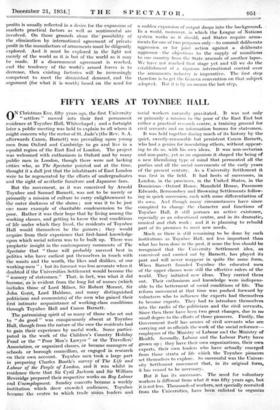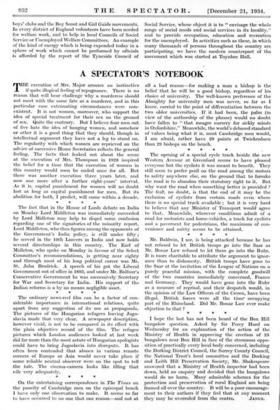FIFTY YEARS AT TOYNBEE HALL
ON Christmas Eve, fifty years ago, the first University " settlers " moved into their first permanent residence at Toynbec Hall, Whitechapel ; and a fortnight later a public meeting was held to explain to all whom it might concern why the rector of St. Jude's (the Rev. S. A. afterwards Canon, Barnett) was prevailing upon young men from Oxford and Cambridge to go and live in a squalid region of the East End of London. The project was welcomed with enthusiasm in Oxford and by many public men in London, though there were not lacking critics who, as The Spectator pointed out at the time, thought it a dull jest that the inhabitants of East London Were to be regenerated by the efforts of undergraduates and the sight of aesthetic furniture and Japanese fans.
But the movement, as it was conceived by Arnold Toynbee and Samuel Barnett, was not to be merely or primarily a mission of culture to carry enlightenment to the outer darkness of the slums ; nor was it to be just one more example of charitable condescension to the poor. Rather it was their hope that by living among the working classes, and getting to know the real conditions of life under which they lived, the residents of Toynbee Hall would themselves be the gainers ; they would acquire from their experience that first-hand knowledge upon which social reform was to be built up. There was prophetic insight in the contemporary comments of The Spectator. that " those will probably succeed best in who ho have earliest put themselves in touch with the wants and the worth, the likes and dislikes, of our working-men " ; but its forecast was less accurate when it doubted if the Universities Settlement would become the " nursery of statesmen." That, in fact, was what it did become; as is evident from the long list of names (which ineliides those of Lord Milner, Sir Robert Morant, Sir John Gorst, Lord Haldane, and many distinguished politicians and economists) of the men who gained their first intimate acquaintance of working-class conditions through Toynbee Hall and Canon Barnett.
The patronizing spirit of so many of those who set out to " do good " was conspicuously absent at Toynbee Hall, though the nature of the case the residents had to gain their experience by useful work. Some partici- pated in the work of the Children's Country Holiday Fund or the " Poor Man's Lawyer " Or the Travellers' Association, or organized classes, or became managers of schools or borough councillors, or engaged in research on their own account. Toynbee men took a large part in preparing Charles Booth's survey of The Life and Labour of the People of London, and it was whilst in residence there that Sir Cyril Jackson and Sir William Beveridge prepared their respective works on Boy Labour and Unemployment: Sunday concerts became a weekly institution which drew crowded audiencei. Toynbee became the centre to which trade union leaders and social workers naturally gravitated. It was not only or primarily a mission to the poor of the East End but rather a practical research centre, a training ground for civil servants and an information bureau for statesmen.
It was held together during much of its history by the quiet, sweetly-reasonable but persistent Canon Barnett, who had a genius for inoculating others, without appear- ing to do so, with his own ideas. It was non-sectarian and non-party, yet as an organism it shaped the being of a new liberalizing type of mind that permeated all the parties and all the social movements of the early years of the present century. As a University Settlement it was first in the field. It had hosts of successors, in London, in the provinces, in the United States, in the Dominions—Oxford House, Mansfield House, Passmore Edwards, Bermondsey and Browning Settlements follow- ing in quick succession, each with some differentiation of its own. And though many circumstances have since conspired to change the character and functions of Toynbee Hall, it still pursues an active existence, especially as an educational centre, and in its dramatic, musical and club work ; and it is planning to rebuild part of its premises to meet new needs.
Much as there is still remaining to be done by such institutions as Toynbec Hall, not less important than what has been done in the past, it none the less should be recognized that the University Settlement idea; as conceived and carried out by Barnett, has played its part and will never reappear in quite the same form. When Barnett founded Toynbee the educated men of the upper classes were still the effective rulers of the world. They initiated new ideas. They carried them out. Their enthusiasm and knowledge were indispens- able to the betterment of social conditions of life. The reform movement at that time was pushed forward by volunteers who to influence the experts had themselves to become experts. They had to introduce themselves into the ranks of the politicians and the civil servants. Since then there have been two great changes, due in no small degree to the efforts of those pioneers. Firstly, the Government itself has armies of civil servants who are carrying out as officials the work of the social reformer— employees of the Ministry of Labour and the Ministry of Health. Secondly, Labour and the Labour Party have 'grown up ; they have their own organizations, their own experts, their own leaders who have actually emerged from those strata of life which the Toynbee pioneers set themselves to explore. So successful was the Univer- sity Settlement movement that, in its original form, it has ceased to be necessary. .
But it has its successors. The need for voluntary "workers -is different from what it was fifty years ago, but it is not less. ThousandS of workers, not specially recruited from the Universities, have been enlisted • to organize boys' clubs and the Boy Scout and Girl Guide movements. In every district of England volunteers have been needed for welfare work, and to help in local Councils of Social Service or Unemployed Welfare Committees. An example of the kind of energy which is being expended today in a sphere of work which cannot be performed by officials is afforded by the report of the Tyneside Council of Social Service, whose object it is to " envisage the whole range of social needs and social services in its locality," and to provide occupation, education and recreation for the unemployed. In activities such as these, in which many thousands of persons throughout the country are participating, we have the modern counterpart of the movement which was started at Toynbee Hall.



































 Previous page
Previous page